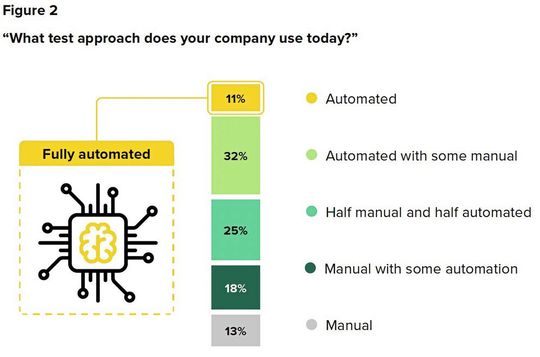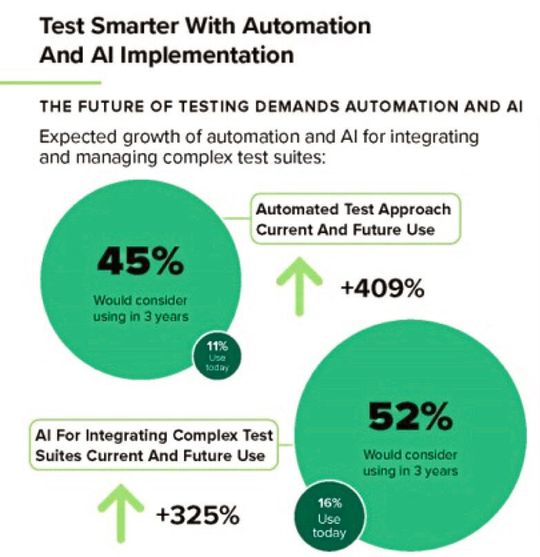Metrology survey
Companies are reluctant to use automated testing
providers on the subject
Complex systems require extensive testing, but according to a Keysight survey, few companies use automated testing or artificial intelligence. However, the advantages of the automated test outweigh the disadvantages.
(Image: (c) Kzenon – stock.adobe.com )
Automated test: In a survey by the measurement technology provider Keysight Technologies, 84 percent of the companies surveyed stated that complex tests are part of their everyday life. The study, titled Conquer Testing Complexities with Automation and Artificial Intelligence (AI), shows that automation is on the rise.
75 percent of companies use a combination of automated and manual tests. However, only 11 percent have a fully automated strategy. As complexity increases, so does testing, at 77 percent, and without automation, product development slows down.
Pressure on companies increases

(Image: Keysight)
The study found that many companies are feeling pressure to automate more testing. Keysight’s Jeff Harris adds, “Manual or semi-automated strategies can’t keep up with the demands of today’s organizations, and without AI-powered automation, they will struggle to manage the test complexity.”
Keysight experts also expect remote testing and automated test sequencing to continue to accelerate. The digital twins are also becoming more important. Development teams want to continue to work together worldwide and from different locations.
How automated testing is impacting organizations
“At Keysight, we are building this workflow insight automation across our entire software product portfolio to meet these needs and drive test and validation automation.”
As the complexity of the text increases, the cycles lengthen. But also how errors and problems that arise are recorded and then rectified. Because the problems directly affect the business results and the product development process. Respondents ranked the impact as follows:
- 51 percent: risk of security vulnerabilities
- 48 percent: Increased costs
- 42 percent: Longer time to market
- 36 percent: Defective product
- 34 percent: loss of income
Test tasks increasingly complex

(Image: Keysight)
Companies are realizing that manual and semi-automated testing strategies cannot keep up with the increasing complexity of products. 45 percent of companies want to consider a fully automated approach in the next three years. This corresponds to an increase of 409 percent.
52 percent of companies said they are considering AI for integrating complex test suites. This corresponds to an increase of 325 percent. Companies expect benefits from switching to intelligent, automated test strategies. Respondents expected operational improvements:
- higher productivity (59 percent),
- Simulate product function or performance (54 percent) and
- the automation or simulation of bug fixes (53 percent).
This results in advantages for companies: higher product quality, higher customer satisfaction (59%), reduced time to market (50%) and more flexible product development cycles (50%).
background of the survey
The study, commissioned by Keysight Technologies, was conducted by Forrester as an online survey of 406 enterprise testing decision makers in North America, EMEA and APAC. Participants were asked questions about their companies’ current test environments, future investments, challenges, and expected outcomes of test automation.
(ID:48531539)
–
As of April 15, 2021
It goes without saying that we handle your personal data responsibly. If we collect personal data from you, we process it in compliance with the applicable data protection regulations. You can find detailed information in our data protection declaration.
Consent to the use of data for advertising purposes
I agree that Vogel Communications Group GmbH & Co. KG, Max-Planckstr. 7-9, 97082 Würzburg, including all companies affiliated with it within the meaning of §§ 15 ff. AktG (hereinafter: Vogel Communications Group) uses my e-mail address for sending editorial newsletters. Listings of the respective associated companies can here be retrieved.
The content of the newsletter extends to the products and services of all the companies mentioned above, including, for example, trade journals and specialist books, events and trade fairs as well as event-related products and services, print and digital media offerings and services such as other (editorial) newsletters, competitions, lead campaigns, Market research in the online and offline area, subject-specific web portals and e-learning offers. If my personal telephone number was also collected, it may be used for submitting offers for the aforementioned products and services from the aforementioned companies and for market research.
If I call up content that is protected on the Internet on portals of the Vogel Communications Group, including its affiliated companies within the meaning of Sections 15 et seq. AktG, I have to register with additional data for access to this content. In return for this free access to editorial content, my data may be used in accordance with this consent for the purposes stated here.
right of revocation
I am aware that I can revoke this consent at any time for the future. My revocation does not affect the legality of the processing carried out on the basis of my consent up to the time of revocation. In order to explain my revocation, I can use the following as an option https://support.vogel.de use the available contact form. If I no longer wish to receive individual newsletters to which I have subscribed, I can also click on the unsubscribe link at the end of a newsletter. I can find more information about my right of withdrawal and how to exercise it, as well as the consequences of my withdrawal, in the data protection declaration, section Editorial newsletters.
–
–
:quality(90)/p7i.vogel.de/wcms/bd/a8/bda8fb1528740d5048db22564e3ae0a2/0106343791.jpeg)

